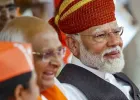- Charcha Patra
- Suniel-Athiya controversy: Why Birth Plans Should Be Guided by Medical Expertise, Not Public Opinion...
Suniel-Athiya controversy: Why Birth Plans Should Be Guided by Medical Expertise, Not Public Opinion

Actor Suniel Shetty recently created controversy following remarks about his daughter Athiya Shetty's natural childbirth. His comments, perceived by many as diminishing the experiences of mothers who undergo cesarean sections (C-sections), sparked widespread criticism. In response, Shetty issued an apology, clarifying that his intention was never to undermine any woman's childbirth experience.

This incident underscores a broader societal issue. There is a tendency to valorize certain childbirth methods over others. Often people do it without a comprehensive understanding of the medical nuances involved. Such narratives can inadvertently place undue pressure on expectant mothers. It leads to feelings of inadequacy or guilt based on their mode of delivery.
The Role of Medical Professionals
Childbirth is a complex medical event. The decisions regarding the mode of delivery should primarily rest with qualified gynecologists and obstetricians. These professionals assess various factors—including the mother's health, fetal well-being, and any potential complications—to determine the safest delivery method. While patient preferences are important, they must be balanced with medical considerations to ensure the best outcomes for both mother and child. 
Empowering Patients Through Education
It's essential for expectant mothers to be well-informed about their childbirth options. Comprehensive prenatal education can empower women to engage in meaningful discussions with their healthcare providers, leading to informed decisions that align with both medical advice and personal values. However, it's crucial to recognize that, even with the best-laid plans, childbirth can be unpredictable, and flexibility is often necessary.
Moving Beyond Societal Judgments
Societal perceptions that label natural childbirth as superior to C-sections are not only unfounded but also harmful. C-sections are major surgical procedures that, in many cases, are life-saving interventions. The decision to undergo a C-section is often made in response to unforeseen complications, and it does not reflect on a mother's strength or dedication.

Every childbirth journey is unique, and the mode of delivery should be determined by medical necessity and informed choice, free from societal pressures or judgments. By respecting the expertise of medical professionals and supporting women in their individual experiences, we can foster a more compassionate and understanding approach to childbirth.
About The Author

Dr. Dipti Patel is a senior gynecologist and obstetrician based in Surat, Gujarat, with over 34 years of experience. She co-founded *Love N Care Hospital* in 1990 and specializes in maternity care, IVF, laparoscopic surgery, and cosmetic gynecology. An alumna of Government Medical College, Surat, she has pursued advanced training in Germany and the U.S. Known for her compassionate approach and clinical expertise, Dr. Patel is a trusted name in women’s healthcare.






















